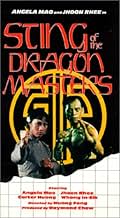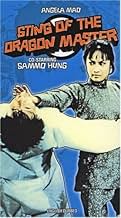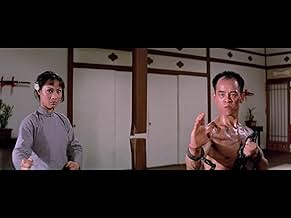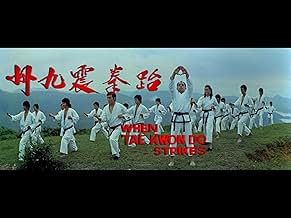Aggiungi una trama nella tua linguaDuring the Japanese occupation of Korea, the leader of a resistance movement, who's also a Taekwondo master, and his apprentices struggle against the brutal Japanese occupiers, aided by a Ch... Leggi tuttoDuring the Japanese occupation of Korea, the leader of a resistance movement, who's also a Taekwondo master, and his apprentices struggle against the brutal Japanese occupiers, aided by a Chinese female martial artist.During the Japanese occupation of Korea, the leader of a resistance movement, who's also a Taekwondo master, and his apprentices struggle against the brutal Japanese occupiers, aided by a Chinese female martial artist.
- Regia
- Sceneggiatura
- Star
Carter Wong
- Jin Zheng Zhi
- (as Carter Huang)
Recensioni in evidenza
This movie made after the 1972 classic Hapkido also starring Angela Mao, is almost like a sequel or part 2 of that movie. The premise is almost identical in that in Japanese occupied Korea, Japanese martial arts school causes trouble with the missionaries, and also the locals. Taekwondo experts stand up to fight the tyranny of the Japanese.
Angela Mao and Sammo Hung also stars in this classic as well as real life Tae Kwon Do master Jhoon Rhee.
When I first saw these movies, I felt that they were cheezy after seeing the Enter the Dragon which were made on a budget that was about 50X that these movies are made on. But when I look at it now, I can see how well these movies were made. On little resources, and and made on short shooting schedule, these actors did amazing feats with their action.
Angela Mao always had incredible screen presence with her school girlish good looks. She still looks amazing today at her age of 62. She almost looks the same as when she made this movie. Compared to Hollywood stars who age very rapidly, I always wonder what these Asian actors do to keep their youthful appearances.
If you want to see power packed kung fu action from the '70s, this movie won't disappoint. It's a beautiful movie that's aged well with time, and would satisfy any kung fu action fans.
Angela Mao and Sammo Hung also stars in this classic as well as real life Tae Kwon Do master Jhoon Rhee.
When I first saw these movies, I felt that they were cheezy after seeing the Enter the Dragon which were made on a budget that was about 50X that these movies are made on. But when I look at it now, I can see how well these movies were made. On little resources, and and made on short shooting schedule, these actors did amazing feats with their action.
Angela Mao always had incredible screen presence with her school girlish good looks. She still looks amazing today at her age of 62. She almost looks the same as when she made this movie. Compared to Hollywood stars who age very rapidly, I always wonder what these Asian actors do to keep their youthful appearances.
If you want to see power packed kung fu action from the '70s, this movie won't disappoint. It's a beautiful movie that's aged well with time, and would satisfy any kung fu action fans.
I won't waste your time by describing the plot for this, the other reviewer already did this quite well. I will however give you my opinion of this movie. This movie is basically anti japanese propoganda. The japanese are portrayed as incredably evil b**tards who have respect for nothing, as well as having very poor martial arts skills (groups of japanese men get there asses kicked by single women on more than one occasion.) The fact that the japanese fighters lose almost every (if not every) fight in the movie kind of takes away the suspense. The plot is actually quite solid and perfect for a kung fu movie though. The problem lies in the fact that there's not much fighting. When there are fights some of the fighting is quite good, but other scenes are choreographed badly. One scene angela mao takes on six japanese in a church and kicks all their asses. The problem is they show her fighting them one by one when they're all supposed to be attacking at the same time. I gather this movie was incredably cheap considering how cheap some of the sets are. They use the same village set for when they are in korea and when they are in china without changing it at all. Some scenes are filmed at real locations though, and they look good. Overall the only real problem with the movie is it's slow moving and uninteresting plot. Since there are few fight scenes we have to rely on the plot for entertainment and, well, I wasn't entertained.
one and a half stars out of four
one and a half stars out of four
While the film is not abundant with taekwondo philosophy or technique, it does tell a story that most American taekwondo students are unfamiliar with. That story is set in the backdrop of the Japanese occupation of Korea during World War II and the Korean resistance to that occupation. This tale of modern oppression is, simultaneously, a tale of how embedded in the fabric of the Korean culture taekwondo is. Rhee plays the leader of the underground resistance who is, of course, a taekwondo Grandmaster. Rhee is forced to reveal his identity, and risk death, in order to attempt to save the life of an imprisoned Catholic Priest.
The film's sparse dialogue is subtitled but the action is plentiful as Rhee is joined by an All Star cast of Asian action stars, including Angela Mao, Carter Wong, Sammo Hung, and many more fighters/actors. While many styles of martial arts are evident, the presence of Rhee and Anne Winton, Rhee's star pupil off the movie screen, remind us that this is, theoretically, a taekwondo action film.
As a snapshot of modern Korean history and a look at the role of Taekwondo in personal defense and the defense of a culture I do recommend this film."
Two years later, in 2018 Grandmaster Rhee would pass away and be mourned all over the world for his contributions to Taekwondo and humanity.
One of the interesting and little know facts about this film was that it was Bruce Lee who introduced his friend, Jhoon Rhee, to Golden Harvest to get the film made. In addition to Lee's friendship with Rhee he liked the fact that the story of the film involved a similar theme to Lee's own Fist of Fury. That theme was resistance to Japanese occupying forces.
The film is also known and been released as Sting of the Dragon Masters and Taekwondo Heroes.
The film's sparse dialogue is subtitled but the action is plentiful as Rhee is joined by an All Star cast of Asian action stars, including Angela Mao, Carter Wong, Sammo Hung, and many more fighters/actors. While many styles of martial arts are evident, the presence of Rhee and Anne Winton, Rhee's star pupil off the movie screen, remind us that this is, theoretically, a taekwondo action film.
As a snapshot of modern Korean history and a look at the role of Taekwondo in personal defense and the defense of a culture I do recommend this film."
Two years later, in 2018 Grandmaster Rhee would pass away and be mourned all over the world for his contributions to Taekwondo and humanity.
One of the interesting and little know facts about this film was that it was Bruce Lee who introduced his friend, Jhoon Rhee, to Golden Harvest to get the film made. In addition to Lee's friendship with Rhee he liked the fact that the story of the film involved a similar theme to Lee's own Fist of Fury. That theme was resistance to Japanese occupying forces.
The film is also known and been released as Sting of the Dragon Masters and Taekwondo Heroes.
STING OF THE DRAGON MASTERS (1973, aka WHEN TAEKWONDO STRIKES) is an unusual kung fu film set largely in Korea during the Japanese occupation in the 1930s and involves an ethnically mixed cast of Chinese, Korean, Japanese and American martial artists. Korean Taekwondo expert Jhoon Rhee plays the leader of the Korean resistance movement and his group includes a Chinese hapkido expert played by Angela Mao, a Korean Taekwondo expert played by Carter Wong, and an American student of the art played by Anne Winton, who has seen her uncle, a Catholic priest, abducted, tortured and finally killed by the Japanese occupying forces. ('The Japs have no respect for religion,' we are told.) A long-haired Samo Hung appears as one of the Japanese karate experts who takes on the heroes in several fights. (He also played a Japanese villain in King Hu's THE VALIANT ONES, 1974.)
The plot centers around the efforts of Rhee to keep his resistance movement alive after being exposed to the Japanese and get a list of his rebel group's members to their contacts in China. This involves lots of fights in the first half of the movie, including at least three in a Catholic church and one in a restaurant. The final battle, pitting the four heroes against the top Japanese villains at the Japanese headquarters in Manchuria, is particularly exciting and filled with great martial arts action.
The film moves quickly and is well shot (on studio sets mixed with actual locations), but suffers from unusually poor English voice dubbing. Worse, the constant stream of inappropriate music cues lifted from other sources is lathered on in the most heavy-handed manner, often drowning out the dialogue. Also, the VHS edition is full frame and severely cropped meaning that much of the fighting action disappears off the sides of the frame.
Even so, the film is worth seeing for the sheer number of superb fights, most of which feature Rhee and Mao taking on the Japanese. Mao is at her peak here and shows off the genuine skills that made her the queen of the kung fu movie for a spell back in the 1970s. The director is Mao's frequent collaborator, Huang Feng, and the movie was produced by Golden Harvest.
ADDENDUM (FEB. 10, 2008): Since writing the above review, this film has come out on DVD, under its original title, WHEN TAEKWONDO STRIKES, from Joy Sales as part of the Fortune Star/Legendary Collection line. The new edition is letter-boxed and in its original language, Mandarin, with English subtitles. The music track is very different and doesn't have the same problems that the soundtrack on the English dub had. Also, the subtitles make it clear that the Catholic priest and his martial artist niece described above are meant to be French, not American. The DVD contains the film's original trailer, which identifies the numerous martial artists cast in the film and their particular specialties. Watching the DVD was like seeing the film for the first time. Highly recommended.
The plot centers around the efforts of Rhee to keep his resistance movement alive after being exposed to the Japanese and get a list of his rebel group's members to their contacts in China. This involves lots of fights in the first half of the movie, including at least three in a Catholic church and one in a restaurant. The final battle, pitting the four heroes against the top Japanese villains at the Japanese headquarters in Manchuria, is particularly exciting and filled with great martial arts action.
The film moves quickly and is well shot (on studio sets mixed with actual locations), but suffers from unusually poor English voice dubbing. Worse, the constant stream of inappropriate music cues lifted from other sources is lathered on in the most heavy-handed manner, often drowning out the dialogue. Also, the VHS edition is full frame and severely cropped meaning that much of the fighting action disappears off the sides of the frame.
Even so, the film is worth seeing for the sheer number of superb fights, most of which feature Rhee and Mao taking on the Japanese. Mao is at her peak here and shows off the genuine skills that made her the queen of the kung fu movie for a spell back in the 1970s. The director is Mao's frequent collaborator, Huang Feng, and the movie was produced by Golden Harvest.
ADDENDUM (FEB. 10, 2008): Since writing the above review, this film has come out on DVD, under its original title, WHEN TAEKWONDO STRIKES, from Joy Sales as part of the Fortune Star/Legendary Collection line. The new edition is letter-boxed and in its original language, Mandarin, with English subtitles. The music track is very different and doesn't have the same problems that the soundtrack on the English dub had. Also, the subtitles make it clear that the Catholic priest and his martial artist niece described above are meant to be French, not American. The DVD contains the film's original trailer, which identifies the numerous martial artists cast in the film and their particular specialties. Watching the DVD was like seeing the film for the first time. Highly recommended.
"Sting of the Dragon Masters" features Jhoon Rhee in his only martial arts film role. Rhee, who is known as the 'Father of American Tae Kwon Do' and counts Muhammad Ali among his students, plays a humble, unassuming man living in Japanese-occupied Korea in the early twentieth century. He makes every effort to conceal his martial skill, but is eventually forced to lash out against the Japanese oppressors. (In this regard, and also because it is a Golden Harvest production, "...Dragon Masters" bears more than a passing resemblance to Bruce Lee's "The Chinese Connection".) Fighting alongside Rhee are chop-socky stalwarts Angela Mao Ying and Carter Wong, while the seemingly endless array of villains includes Whang Ing-Sik (dressed in a very loud kimono) and Sammo Hung. As is the case with many martial arts films, the storyline is simple and exists primarily to link the fight scenes together. But, good god, what fight scenes they are! "Sting of the Dragon Masters" offers spectacular, jaw-dropping action, with a special focus on kicks (as you might expect from a film whose alternate title is "When Tae Kwon Do Strikes"), and you'll certainly feel that you've gotten your money's worth by the time the closing credits roll.
Lo sapevi?
- QuizBruce Lee was not in the movie "When Taekwondo Strikes," but he played a key role in getting the film made. He convinced Golden Harvest to produce the film, starring his friend Jhoon Rhee, a well-known Taekwondo instructor. Bruce Lee's involvement was primarily behind the scenes, helping to facilitate the production.
- Versioni alternativeThe UK theatrical version was heavily cut to remove the whipping of the priest, as well as substantial cuts to the fight scenes, including blows to head, kicks, chain-fighting, and a man being knocked down the stairs.
- ConnessioniFeatured in The Best of the Martial Arts Films (1990)
I più visti
Accedi per valutare e creare un elenco di titoli salvati per ottenere consigli personalizzati
Dettagli
- Tempo di esecuzione
- 1h 31min(91 min)
- Mix di suoni
- Proporzioni
- 2.35 : 1
Contribuisci a questa pagina
Suggerisci una modifica o aggiungi i contenuti mancanti





















